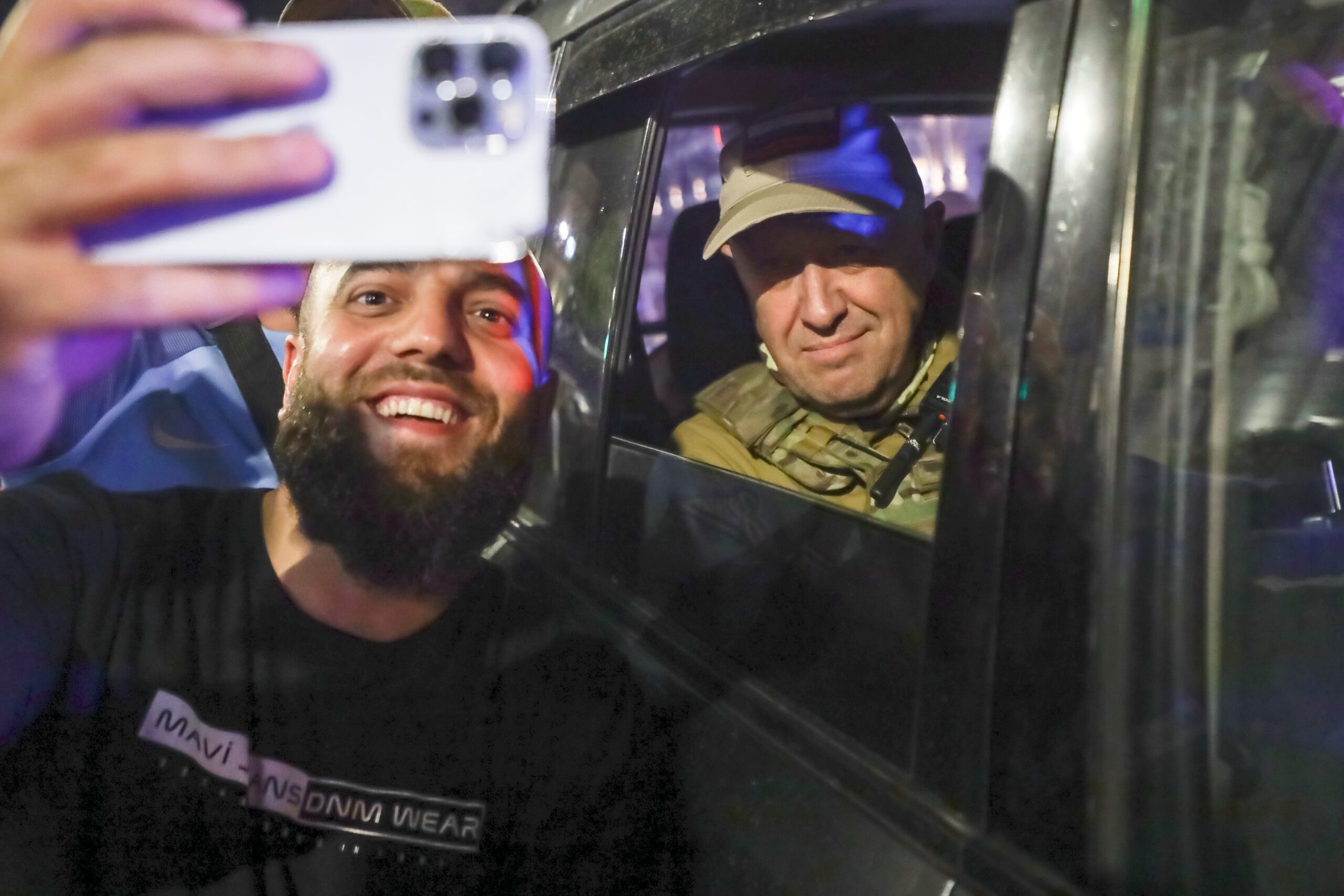

WASHINGTON− Wagner mercenary group leader Yevgeny Prigozhin's Russian mutiny has failed and he's been exiled to Belarus. But Prigozhin, through his close ties to Vladimir Putin, also happens to be the owner and operator of other Kremlin-supported organizations that the U.S. says were behind the Kremlin's hacking of U.S. elections since 2016 and other political information operations around the world.
Here's what to know about Prigozhin’s U.S. election tampering efforts and what his failed mutiny might mean for the 2024 U.S. presidential election:
Prigozhin’s “troll farm,” the Internet Research Agency: protecting Russia from the "boorish and aggressive" West
Besides the Wagner Group private military organization, Prigozhin owned and operated the St. Petersburg-based Internet Research Agency, which U.S. officials have described as a massive “troll farm” that has been meddling in American politics since at least 2014.
A "troll farm" is an organized operation of many users who may work together in a "factory" or from different places across a distributed network to generate online traffic aimed at affecting public opinion, and to spread misinformation and disinformation.
The name comes from the term "troll," which is someone who joins a social media discussion on Facebook or Twitter, for example, and posts comments that are often provocative or inflammatory, or designed to persuade others about a particular topic or political candidate.
In 2018, the U.S. Justice Department indicted the IRA, Prigozhin and a dozen other individuals for overseeing the Internet Research Agency and using scores of well-paid operatives to create thousands of false posts and other disinformation in the 2016 presidential election.
The U.S. Treasury Department also levied sanctions against the IRA in 2018, accusing it of “significant malicious cyber-enabled activities.”
Prigozhin, often called "Putin's chef" because of his upscale catering business, initially denied any connection to the IRA, and also to the Wagner Group. He even took legal action against journalists who linked him to the troll farm. But in February, he confirmed his role in it, and in using it to push Kremlin propaganda narratives around the globe over the past decade.
"I was never just a financier of the Internet Research Agency. I invented it, I created it, I ran it for a long time," Prigozhin said in a post shared on social media by the press service of his Concord catering group, according to the Reuters news agency.
Prigozhin said he created the IRA “to protect the Russian information space from the West's boorish and aggressive anti-Russian propaganda.”
More:Will Vladimir Putin keep his grip on power? Coup attempt dials up pressure over Ukraine war
How could Russian “trolls” influence US elections?
Americans first came to know the IRA during special counsel Robert Mueller's report into Russian interference in the 2016 presidential election, which detailed Moscow's “sweeping and systematic” political warfare against the American electoral system.
In his lengthy report, Mueller, the former FBI director, detailed how the IRA was funded by Prigozhin and how it conducted an “active measures” campaign through social media − including Twitter, Facebook and Instagram − starting as early as 2014.
Mueller, and the 2018 Justice Department indictment of the IRA, said it created fake accounts and coordinated their efforts to sow chaos and exploit divisions among Americans on hot-button issues. and, ultimately, to try and persuade them to vote for Republican Donald Trump over his Democratic rival, Hillary Clinton. To amplify those messages, they also flooded social media with posts using botnets, or networks of private computers infected with malicious software and controlled as a group without the owners' knowledge.
In some cases, IRA officials went so far as to travel to the United States "under false pretenses for the purpose of collecting intelligence to inform" IRA operations, the indictment said.
In other instances, they created social media accounts, groups and pages designed to look like they were controlled by U.S. activists or regular U.S. citizens, according to the indictment. It said the IRA, Prigozhin, his Concord Management and Concord Catering firms and 12 other IRA employees used the stolen identities of real people to post on social media accounts they controlled.
Those included creating and operating large numbers of fake online social media accounts, including some that posed as individuals and legitimate grassroots organizations and interest groups. One Twitter account called "Tennessee GOP" or @TEN_GOP falsely claimed to be affiliated with the Tennessee Republican Party. "Over time, the @TEN_GOP account attracted more than 100,000 online followers," the DOJ indictment said.
The Treasury sanctions said the IRA ultimately “posted thousands of ads that reached millions of people online,” and even organized and coordinated political rallies in the U.S. during the run-up to the 2016 election, “all while hiding its Russian identity.”
What’s the status of the IRA now?
The IRA’s status, just like Prigozhin’s, is unclear.
As his Wagner Group troops were advancing on Moscow June 24, Prigozhin suddenly called off the rebellion after negotiations with Belarus' authoritarian President Alexander Lukashenko. He and at least parts of the Wagner Group remain in that country although their status isn’t clear.
Recent news reports have said that the Russian government has, or will, put the IRA up for sale along with some of Prigozhin’s other companies. On July 2, an aide said Prigozhin’s media holding group will shut down, including the IRA.
"I am announcing our decision to close down and to leave the country's information space," Yevgeny Zubarev, director of the RIA FAN news site said in a video clip posted online.
The Russian newspaper Kommersant also reported that the country's communications watchdog Roskomnadzor had blocked media outlets linked to Prigozhin, without elaborating.
What does it mean for IRA influence operations in the US, including the 2024 election?
"The Kremlin is bound to be uneasy leaving him in control of their propaganda apparatus," said John Hultquist, the chief analyst for Mandiant Intelligence - Google Cloud, which advises U.S. and foreign governments and private companies on cybersecurity issues.
Hultquist told USA TODAY that the IRA likely has its own institutional backers within the Russian government and military who could take it over, including within the Kremlin's main military intelligence service. That agency is commonly known by the Russian acronym GRU, which stands for the Main Intelligence Directorate.
Gavin Wilde, a former National Security Council Russia and cybersecurity expert, said the name or ownership of the IRA might change, but that its infrastructure likely will be used to target the U.S. in the upcoming election.
“I personally don't think it's going to remain inactive for long, if at all. My money says by this time in the autumn, it will look much more like "rebranding, under new management" than "shut down," said Wilde, who co-authored a U.S. intelligence community assessment of Russian activities targeting the 2016 U.S. presidential election.
Also, he said, “There are probably far too many informal arrangements with other state, quasi-state, and foreign organizations to simply close up shop,” especially because IRA also has been used to quell domestic dissent online, something that is likely to be especially important for Putin right now.
More on the Internet Research Agency:'LET'S CHAT,' State Department tells foreign election hackers, offering $10M bounty
Has the IRA actually helped sway US elections?
Wilde said the IRA "certainly has been active to some degree in 2020 and possibly 2022" election cycles in the U.S. and that its efforts are likely to continue.
Whether they will be effective is another matter.
In the 2016 election, the U.S. intelligence community assessment “explicitly went out of its way not to assess the impact” that the IRA had on the outcome of the election, said Wilde, who also served in leadership roles at the National Security Agency for more than a decade.
But Wilde cited a January report in the Nature Communications journal that found that IRA efforts in 2016 likely had little effect because exposure to its postings was concentrated among users who strongly identified as Republicans and because “exposure to the Russian influence campaign was eclipsed by content from domestic news media and politicians.”
In the 2024 election, Wilde said political campaigns, security firms and especially the U.S. government will be vigilant, and likely to expose Russian disinformation campaigns and troll farms, even if they are operating under new names.
"My sense is that they've always been up to a lot," he said. "The issue has more been that a lot of platforms are just better at spotting and taking them down now. Or that they're so well-monitored by platforms and civil society and governments that they're easier to call out and end up just preaching to the already converted in a lot of ways."
Source link







